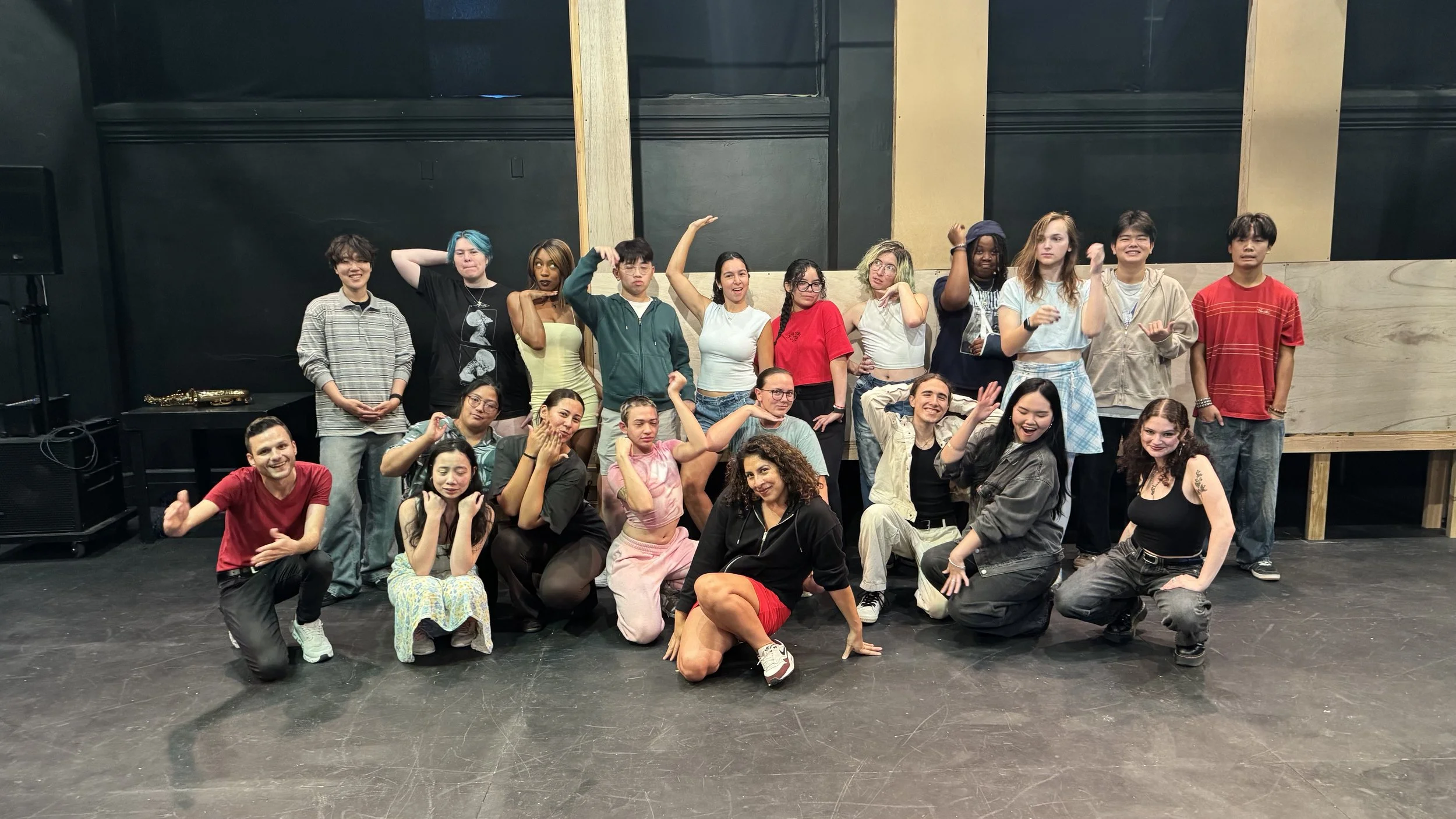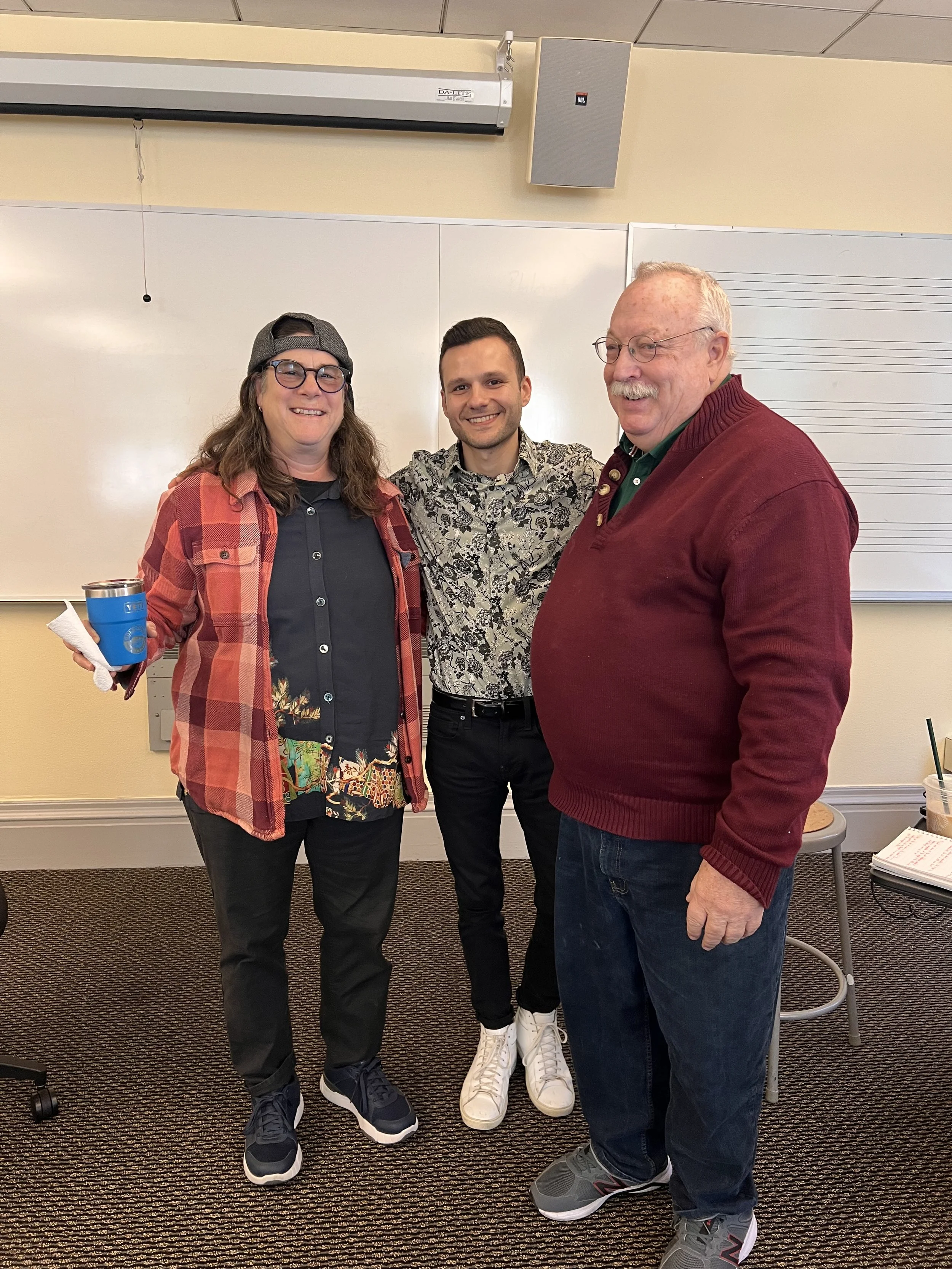Teaching
I currently teach in the Performing Arts Department at the University of San Francisco and the Professional Development Department at the San Francisco Conservatory of Music. My teaching centers on the idea that music education should inspire creativity, foster critical and cultural awareness, and support students’ growth as artists, thinkers, and community members.
EXPANDING YOUR DIGITAL PRESENCE, SAN FRANCISCO CONSERVATORY OF MUSIC
GUEST LECTURE, LEWIS UNIVERSITY
Courses
*developed and taught
Professional Development
-
This course is aimed at beginning conversations with creatives about how their art can become a livelihood, and how they can strategically choose opportunities that will enable them to meet success. Building a professional portfolio, digital media marketing, and audience development are just a few topics that will be explored in this course.
This course involves an internship/volunteer component in collaboration with a non-profit arts organization in the San Francisco Bay Area. These internships are designed to provide you with opportunities to develop the skills and experience necessary for success in the cultural arts sector, while also leaving you poised to pursue opportunities in teaching, performance, arts administration, business, finance, design, office management, and other professional areas.
-
With an emphasis on entrepreneurship and nonprofit management, this course introduces practical application of arts training to community service. Students will develop organizational portfolios including Mission, Vision, Programming, Budgeting, Fundraising, and Marketing elements while learning from active arts community servants.
-
Professional Fundamentals is a module-length course intended to introduce students at SFCM to some of the core topics necessary for success as a 21st-century professional. In addition to learning these foundational skills, students will explore the wide array of career options available to them with a degree in music and discover how their skills as a musician can be used for success in any field. Topics will include building a professional portfolio, performance psychology, and time management.
-
(From SFCM): Developing a digital presence is especially important for musicians to consider as they promote their work and create a funnel strategy for converting first-time visitors into devoted fans. In this class, you will create the materials needed for an effective digital presence—including a website, email newsletter, and (professional) social media presence—and learn the best practices for developing a unique brand and promoting yourself online.
-
Financial Literacy is a module-length course where students will familiarize themselves with the essential aspects of money management.
Music & Culture
-
This course investigates queer identities in contemporary culture by analyzing popular, traditional, and undocumented musical examples of songs confronting the height of the HIV/AIDS epidemic in the San Francisco Bay Area. Musical technique (vocal/instrumental), sonic characteristics, performance practices, lyrical classification, and visual media elements will be examined for how they contribute to defining the relationship between music, identity, public health, and activism. The goal of the course is to increase awareness regarding the relationship between music and identity, the role of identity in music-making/listening, as well as the function of music as integral within a greater public health crisis and political/social movement.
-
“Singing for Our Lives” is an interdisciplinary course that investigates LGBTQIA+ identities in contemporary culture by analyzing popular, traditional, and undocumented musical examples of songs confronting prominent social movements in the San Francisco Bay Area between 1970 and the present, most notably the height of the HIV/AIDS epidemic. Musical technique (vocal/instrumental), sonic characteristics, performance practices, lyrical classification, poetics, composition, and visual media elements will be examined for how they contribute to understanding the relationship between music, identity, public health, and activism, and how to apply these tenets within our current landscape of community-engaged arts activism. Our projects in this course are in collaboration with community partners to commemorate the launch of the National AIDS Memorial’s Center for Social Justice, and the Pride in the Park event in May.
The community-engaged experience in this course will allow students to examine how course concepts, themes, and theories play out in a community setting, develop skills and commitments to participate effectively in civic life, and address community-identified priorities and needs to advance the public good.
-
This course explores the intersections of music, culture, and gender in order to understand the diverse social roles that music played in the lives of individuals adopting various gender identities. This class will consider how gender identities were constructed through musical composition, performance, and music-making throughout history. We will investigate the cultural impact that gender had on musical style, reception, and professionalization, and domestic performance by consulting “case studies” of specific composers, performers, and audiences.
-
This course investigates various strategies of music and activist organizing from around the world. The majority of the course focuses on how music intersects with political and social change through readings and resources, such as sheet music and videos.
We will study Freedom Songs used in the Civil Rights Movement in the United States, Struggle Songs used in the Anti-Apartheid Movement in South Africa, music of the Nueva Canción Movement in Latin America, Okinawan Eisa in Japan, hip-hop organizing, labor movement music, Riot Grrrls, and other music making to understand how sound and performance empowers people who seek collective justice.
The course culminates with the launch of student-created Action Plans.
Performance
-
This course is designed to provide private saxophone lessons to students majoring in music. Meetings will consist of 60-minute lessons occurring once per week. Students are expected to prepare assignments (i.e. repertoire) by practicing outside of the lesson, and perform assignments during their time with the instructor. The instructor will provide feedback during the lesson by offering suggestions for improved performance and learning. To introduce the student to the significant solo repertoire in the woodwind area, giving them criteria for personally evaluating and identifying literature of significant musical value. In addition, the student will analyze and listen to masterworks and other significant works for each instrument and be able to identify aurally and describe salient features of these works.
-
Around the world, performing artists engage with complex issues to strengthen communities and promote change. Introduction to Performing Arts & Social Justice uses an interdisciplinary, cross-cultural approach to survey the dynamic and effective strategies of artists engaged in social justice work. The class investigates topics such as systemic violence, power, and privilege, alongside community-building, ethics, and identity. Analyzing artistic processes from multiple perspectives provides frameworks to understand project design and implementation.
-
This course offers undergraduate musicians an immersive, collaborative experience in chamber music performance. Students are placed into small ensembles (duos, trios, quartets, etc.) and assigned repertoire appropriate to their skill level and instrumentation. Through weekly coachings, rehearsals, and masterclasses, students will refine ensemble techniques, develop interpretive insight, and strengthen communication skills within the group. The course emphasizes both historical understanding and creative expression, drawing on repertoire from the classical canon to contemporary works.
Participation culminates in a public performance at the end of the semester. Students are expected to engage in regular, self-directed rehearsal outside of class meetings.
We will study Freedom Songs used in the Civil Rights Movement in the United States, Struggle Songs used in the Anti-Apartheid Movement in South Africa, music of the Nueva Canción Movement in Latin America, Okinawan Eisa in Japan, hip-hop organizing, labor movement music, Riot Grrrls, and other music making to understand how sound and performance empowers people who seek collective justice.
The course culminates with the launch of student-created Action Plans.
Testimonials




